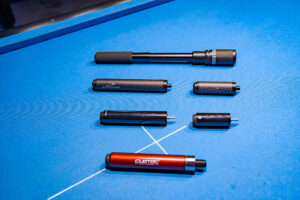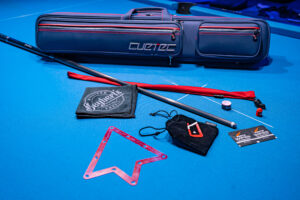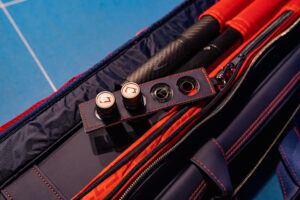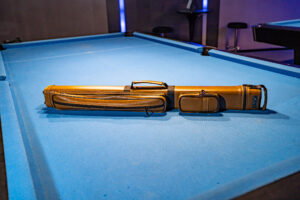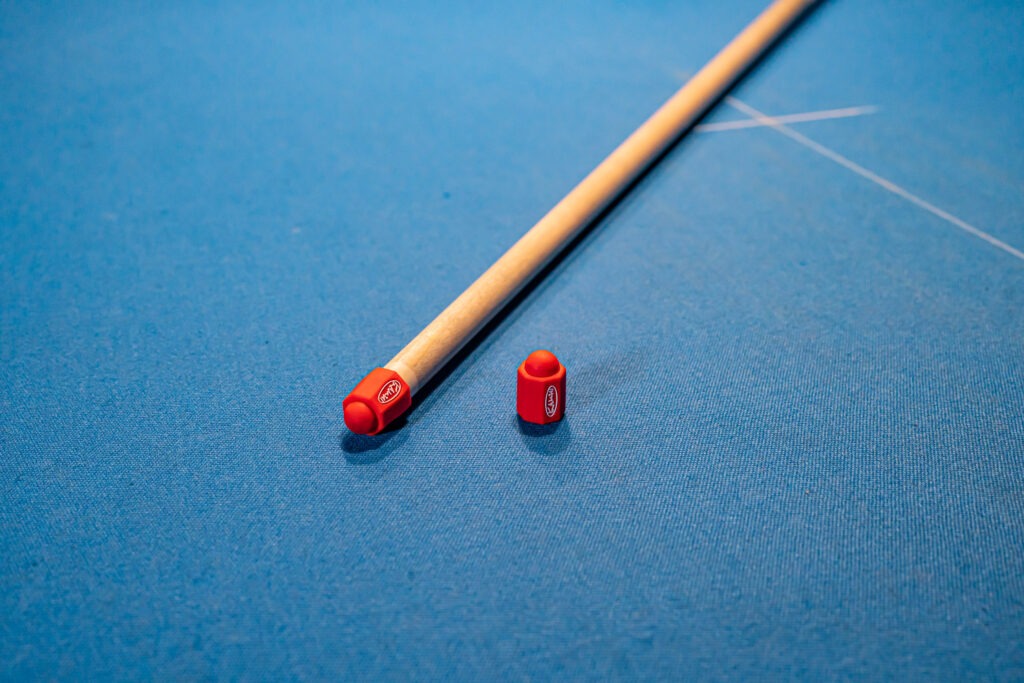
Longoni Pro Jump Shaft
Have you ever wondered how your shaft impacts the way you play, how should you maintain it or if you are making a mistake using one?
Lets dive into the mystery world of hardwood shafts and find out!
Hardwood pool cue shafts are a popular choice among billiards players, prized for their durability, precision, and traditional feel. In this analysis, we’ll explore their advantages, disadvantages, considerations regarding humidity, maintenance requirements, durability, and their impact on deflection.
Advantages:
- Durability: Hardwood shafts, typically made from woods like maple or ash, are known for their resilience against wear and tear, making them a long-lasting investment for players.
- Consistency: Hardwood shafts offer a consistent playing experience, as they maintain their shape and stiffness over time, allowing players to develop a precise and reliable stroke.
- Feel and Feedback: Many players prefer the natural feel and feedback provided by hardwood shafts, which can enhance their ability to control the cue ball with precision.
- Customization: Hardwood shafts can be customized to suit individual player preferences, including taper, diameter, and finish, allowing for a personalized playing experience.
Disadvantages:
- Weight Variability: While hardwood shafts are generally durable, there can be variability in weight and density between shafts, which may affect player consistency and performance.
- Maintenance Requirements: Hardwood shafts require regular maintenance to preserve their performance and appearance, including cleaning, polishing, and occasional shaft conditioning.
- Sensitivity to Humidity: Changes in humidity levels can impact the performance of hardwood shafts, causing them to expand or contract, which may affect playability and consistency.
Humidity Considerations:
Hardwood shafts are susceptible to changes in humidity, which can cause them to warp or become misshapen. To mitigate this, players should store their cues in a controlled environment with stable humidity levels, and use a protective cue case when transporting them to prevent exposure to extreme conditions.
Maintenance:
Proper maintenance is essential for preserving the performance and appearance of hardwood shafts. Regular cleaning with a soft cloth and mild cleaner, followed by polishing with a cue wax or conditioner, can help remove dirt and oils and keep the shaft smooth and sleek!!!
- Cleaning:
- Regular cleaning is necessary to remove dirt, chalk residue, and oils that accumulate on the shaft’s surface during gameplay.
- Use a soft, lint-free cloth dampened with water or a mild cue shaft cleaner to gently wipe down the shaft, focusing on one section at a time.
- Avoid using harsh chemicals or abrasive materials that could damage the wood or finish.
- Polishing:
- After cleaning, it’s beneficial to polish the shaft to restore its smoothness and luster.
- Apply a small amount of cue wax or shaft conditioner onto a clean, soft cloth.
- Rub the wax or conditioner onto the shaft in a circular motion, covering the entire surface evenly.
- Buff the shaft with a dry cloth to remove any excess wax and achieve a smooth, polished finish
- Shaft Conditioning:
- Periodically conditioning the shaft helps maintain its moisture balance and prevents it from drying out or becoming too sticky.
- Use a specialized cue shaft conditioner or shaft slicker to apply a thin layer of conditioning agent to the shaft.
- Gently rub the conditioner into the wood using long, smooth strokes, working from the base to the tip.
- Allow the conditioner to penetrate the wood for a few minutes before wiping off any excess with a clean cloth.
- Storage:
- Proper storage is essential for protecting the shaft from environmental factors that could cause warping or damage.
- Store the cue in a cue case or rack when not in use to shield it from dust, moisture, and fluctuations in temperature and humidity.
- Avoid leaning the cue against walls or surfaces where it could be knocked over or exposed to impact.
- Inspection:
- Regularly inspect the shaft for any signs of damage, such as cracks, dents, or splinters.
- Pay attention to the ferrule and joint areas, as these are common areas for wear and tear.
- Address any issues promptly to prevent further damage and maintain optimal performance.
- Professional Maintenance:
- For deeper cleaning or repair needs, consider seeking professional maintenance services from a cue technician or cue maker.
- Professional cleaning and refinishing can help restore the shaft to its original condition and extend its lifespan.
- By following these maintenance practices consistently, players can ensure that their hardwood pool cue shafts remain in top condition, providing reliable performance and enjoyment for years to come.
Durability:
Hardwood shafts are renowned for their durability, capable of withstanding the rigors of regular play without compromising performance. With proper care and maintenance, a hardwood shaft can last for many years, making it a worthwhile investment for serious players.
Durability in hardwood pool cue shafts primarily refers to their ability to withstand the repeated impacts and stresses of gameplay without losing structural integrity or performance. Hardwood shafts, typically made from woods like maple or ash, are known for their robustness and resilience.
- Impact Resistance: Hardwood shafts are capable of enduring the force exerted during cue ball strikes without deforming or breaking. This resilience ensures that the shaft maintains its shape and stiffness over time, providing consistent performance with each shot.
- Resistance to Warping: Hardwood shafts are less prone to warping compared to softer materials or laminated shafts. This resistance to warping helps maintain the straightness and accuracy of the cue, ensuring a precise and reliable stroke.
- Longevity: Due to their durability, hardwood shafts can withstand years of regular use and play without significant deterioration. With proper care and maintenance, they can retain their performance characteristics for an extended period, making them a durable investment for serious players.
Deflection:
Deflection refers to the deviation of the cue ball’s path when struck off-center due to the shaft’s flex. Due to the fact that the wood which hardwood shafts are made of is harder, the deviation is lower compared to softwood shafts. Some of the specifics are:
- Flexibility: Hardwood shafts possess a certain degree of flexibility, which influences the amount of deflection experienced during a shot. The stiffness of the wood, along with factors such as taper and diameter, determines the extent of shaft flex and subsequent cue ball deflection.
- Impact on Accuracy: Deflection can affect the accuracy and consistency of a player’s shots, especially when using side spin or English to control the cue ball’s path. Understanding and adjusting for the amount of deflection inherent in a hardwood shaft is essential for skilled players seeking precision in their gameplay.
- Player Preference: Some players prefer cues with minimal deflection, as it allows for more precise aim and control over the cue ball’s trajectory. Others may adapt their playing style to compensate for deflection, incorporating techniques to account for the cue ball’s deviation when striking off-center.
Conclusion:
Hardwood pool cue shafts offer a classic playing experience characterized by durability, consistency, and a natural feel. While they require regular maintenance and may be sensitive to humidity, their reliability and performance make them a preferred choice for many players. With proper care, a hardwood shaft can provide years of enjoyment and competitive play, making it a worthy investment for billiards enthusiasts.

